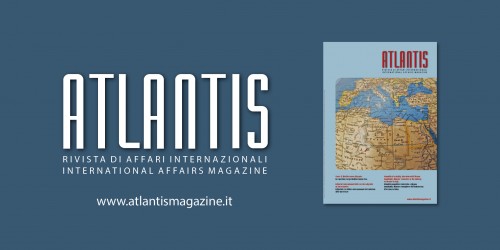5/10/2024 Ambassador Maurizio Melani at the eighth meeting of the PCTO "Introduction to Geopolitics"
Ambassador Maurizio Melani was the speaker at the eighth meeting of the innovative PCTO "Introduction to Geopolitics", an effect of the memorandum of understanding (DGR. 1507/2023) between the Veneto Region, the Veneto Regional School Office and the M9 Foundation, with the operational collaboration of the magazine “Atlantis” and Mazzanti Libri.
The theme of the eighth meeting, held on 9 April 2024, was "Development and conflicts in Africa, the Mediterranean and the Middle East".
The large turnout from the Venetian secondary schools participating in the initiative was numerous and active, in continuity with the interest shown in previous meetings.
As usual, at the opening of the event there were institutional greetings from Serena Bertolucci, director of M9-Museo del '900; Marco Bussetti, director of the Regional School Office for the Veneto, and Elena Donazzan, councilor for education of the Veneto Region.
Ambassador Melani had already held the introductory module of the PCTO, through two meetings, respectively on 6 and 20 February 2024, entitled "Foundations of the History of International Relations and International Organizations".
The appointment on 9 April contributed to enriching the geopolitical framework presented to the participating students, and consolidated during the PCTO's work; focusing specifically on the hot areas of Africa and the Mediterranean.
Particular attention was then placed on the Middle East, dramatically at the center of the current international crisis scenarios.
Ambassador Melani's speech provided a timely summary of the geopolitical events in Africa, from the period of colonial experiences to the era of decolonization in the 1960s, and then tied the threads of the discussion to current events.
The same procedure was carried out in discussing the Middle East, placing particular emphasis on the tensions that the Palestinian population has experienced over the last century, up to the creation of the State of Israel and the subsequent clashes.
The eighth meeting of the PCTO course "Introduction to Geopolitics" therefore began an in-depth journey towards geopolitical current affairs, which will be carried forward both in a multidisciplinary and regional perspective in the following three appointments.
The next meeting of the PCTO is scheduled for Tuesday 16 April, with the participation of Ambassador Piero Benassi. On this occasion, Ambassador Benassi will discuss the theme "Interdisciplinarity in Geopolitics", offering students the tools to develop a fluid and multidisciplinary approach to look at geopolitics, which is now increasingly indispensable in today's period.
Agata Lucchetta




